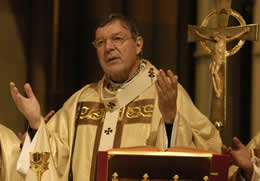
George Cardinal Pell of Sidney, Australia.
His Eminence has an article in his dioceasan newspaper concerning the problem of sexual addiction. One of the few Cardinals or Archbishops in the Church to really address this problem - to my knowledge at least. SA or sexual addiction groups have been around for well over a decade. In fact much of the research for this type of recovery has been developed in the Twin Cities at the Courage Center in Golden Valley. The support groups are based on AA groups and normally work from the 12 step program of recovery. Some celebrities have been in treatment here. As in any addiction, there are usually many other dynamics at work causing the behavior. Addictions and obsessive compulsive behaviors are often symptoms of a deeper problem.
I know a few people who have gone through these programs and also have participated in the SA groups. There are mixed reviews about it. The counselling is helpful to a point in discovering the root problems of the addiction, the meaning behind the act, so to say. The support group thing is helpful as well, although people say it keeps them focused upon the problem. The effort and accompanying anxiety to avoid acting out sometimes keeps their attention upon the attraction or habit. There are often relapses. But there are relapses for those in treatment for substance abuse as well.
I know a theologion and psychologist who disagree with the idea of sexual addiction and cite St. Augustine and his conversion, as well as St. Paul who said, "God does not allow us to be tempted beyond our strength." This priest I know questions the theory by saying that it takes the fact of man's free will out of the equation - man is free to choose or reject every temptation. Granted, one may experience an overwhelming compulsion, either forged through habitual sin or some other condition. Naturally the person's culpability is lessened if that is the case.
What is missing in secular treatments is an authentic spiritual component. There ought to be a substantial spiritual plan with an emphasis on life style changes, especially avoiding near occassions of sin, the practice of mortification, and authentic mental prayer, as well as sacramental confession. The person must realize that they have forged a chain of sins or inappropriate behaviors that having become habitual and psychologically gratifying seem to also be stronger than their will. Recovery is a process of effort, falling and rising, yet trusting in the Lord to lead them to victory. There is no miraculous cure normally, the Lord expects us to work with His grace and to ask for His mercy. Therapy, groups, medication - all of these things are good and often necessary at times - but prayer and mortification and the sacraments are the ultimate remedies. A nun once said to me, "A saint is a sinner who keeps trying." Sometimes Our Lord does deliver a person suddenly and seemingly spontaneously from an addiction.
I have another friend who, at adoration during the Holy Year of 2000, told me he heard a voice he felt was the Lord's say to him, "You are free!" He told me recently that his sexual difficulties never afflicted him again, he felt he had finally been given the gift of chastity. We can have faith that God does indeed hear our prayers, for this man I speak of wrestled with his affliction for almost 20 years!
Remember what Pope John Paul I said regarding serious sins, even habitual sins:
"I will limit myself to recommending one virtue so dear to the Lord: He said, 'Learn from me who am meek and humble of heart." I risk saying an error, but I am saying it: the Lord loves humility so much that, sometimes, he permits grave sins. Why? So that those who have committed these sins, afterwards, having repented, may remain humble. One is not tempted to believe oneself half–saint or half–angel, when one knows that one has committed grave faults. The Lord so much recommended: be humble."
Anyone struggling with habitual sins need to have humility, along with confidence and love, trusting in the Sacred Heart of Jesus. I hope Cardinal Pell does not rely only upon the psychological establishment and realizes the Church has a treasury of resources to help people now recognized as suffering from sexual addiction. We have the Eucharist and the sacrament of penance.
Finally, at the root of it all, the addict is just really saying, "Say you love me!" (That's a song too. Segues nicely with Robert Palmer's "Addicted to Love.")
(Sorry for the quality of this post - I was rushing to be beat the shut-down time eblogger posted that is supposed to occur this afternoon.)
No comments:
Post a Comment